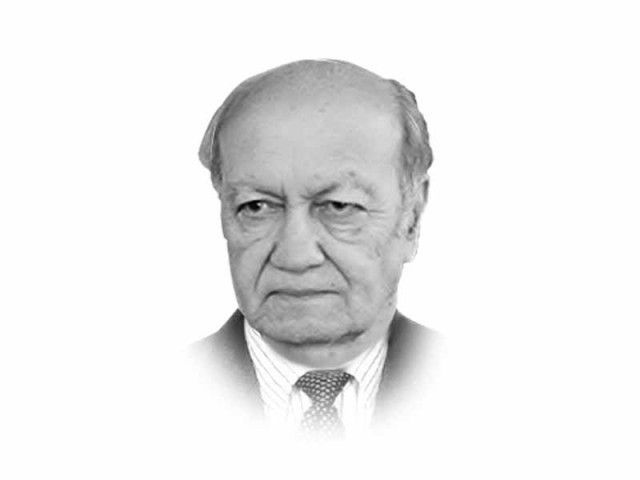Optimising national power
Without good governance, it will be difficult to steer the country toward prosperity

The writer is a retired lieutenant general of the Pakistan Army and a former federal secretary. He has also served as chairman of the Pakistan Ordnance Factories Board
China and Japan have conflicting territorial claim over the Senkaku Islands yet mutual trade flourishes. China is Japan’s second-largest trade partner, while Japan ranks fifth among China’s trading partners.
Similarly, one can quote innumerable examples where neighbouring countries despite festering border disputes have managed to develop strong economic and trade relations. This has also given rise to strong lobbies developing in each country for a better and a more amiable relationship.
South Asia, and India and Pakistan in particular are an exception where trade and commerce has been the first victim of their perennial hostility. This has denied the huge potential of regional cooperation and faster economic growth. There have been several other adverse implications as greater share of resources are perforce allocated for defence and security. Pakistan being a weaker economy suffers proportionately far more.
Realising Pakistan’s economic vulnerabilities India is coming out with several subtle plans to keep Pakistan off balance. The recent intelligence leak that India was likely to carry out a clandestine raid during the middle of this month understandably raised alarm bells in Pakistan and forced its armed forces on high alert. In retrospect the question arises was this a ruse to maintain strategic pressure and further strain Pakistan’s economy? For it would defy logic that in the midst of a national election involving 900 million people the country would venture a deliberate military operation. Even if one were to accept the premise that there was a genuine possibility of an Indian adventure, it would have been advisable not going public about it, as it has consequences of placing brakes on a struggling economy. Investment would shy away and tourism and travel that have yet to take off shrink.
Prime Minister Modi’s tirade against Pakistan during the election campaign continues unabated. In addition, Modi and his party’s discrimination against Indian Muslims, brutal suppression of Kashmiri freedom struggle, propagation of an intense Hindu-leaning nationalism coupled with unending hostility against Pakistan poses a serious foreign policy challenge. Moreover, it is not certain if there would be any recalibration of Indian policy after the elections leading to easing of pressure on Pakistan and engagement with the Kashmiri leadership.
As though troubles with India were not enough to keep the Foreign Office and the military on high alert, relations with Afghanistan took a turn for the worse when PM Imran Khan in his well-meaning but simplistic approach to foreign relations tried to solicit advice to the Afghan government. His repeated “brotherly advice” that forming an interim government might facilitate peace talks between US and Taliban officials was strongly resented by the Afghan Government and labelled as interference in their internal affairs. Apparently, the Afghan top leadership and the ambassador were livid after the PM’s repeated assertion of his unsolicited viewpoint. The negative fallout of it is that the trust and goodwill that COAS General Bajwa has been relentlessly trying to build with the Afghan leadership over several months received a setback. We need to realise that the Afghan leadership is highly sensitive to Pakistan’s interference in its internal matters. This has pushed it more towards India and developing strong ties with Iran and other neighbours. Pakistan’s facilitation in promoting direct US–Taliban dialogue has not gone well with the Afghan government either.
The US-Pakistan relations received a temporary boost as the latter facilitated the Taliban leadership to engage with the US. But how long this goodwill is likely to last is not certain. US Special Representative for Afghanistan Reconciliation Ambassador Zalmay Khalilzad recently warned Pakistan to change its policy towards Afghanistan “otherwise Islamabad and Washington’s ties will not improve”. He is also advocating a possible peace agreement between Afghanistan and Pakistan to rebuild mutual confidence and remove any misapprehensions of interference. The proposal has merit depending on its terms and their acceptability by the parties concerned.
Islamabad’s relations with Tehran have improved to some extent but Pakistan’s strong ties with Saudi Arabia and border incidents on the Balochistan border and killing and sectarian violence against Shia and Hazara community in particular add to frequent tensions.
But the brighter side is that Pakistan has strong relationship foremost with China, Turkey, Saudi Arabia, Central Asian and Gulf states. Pakistan has been successful in developing good relations with Russia as well. It has made strides in improving relations with the European Union and enjoys strong bonds with the UK. This largely helps in countervailing India’s efforts at isolating Pakistan.
The effort by this and successive governments should be to attain economic viability. Unless Pakistan does not acquire economic autonomy its potential to exploit its political and strategic power will remain constrained. Hopefully, Pakistan would be able to successfully negotiate a deal with the IMF to tide over the current crisis. The real challenge is to address the economy as a part of a comprehensive national effort.
Without good governance, a modicum of political stability, emphasis on education and the health sector, mutual respect and support among national institutions, it would be difficult to steer the country toward prosperity. These should be the benchmarks of a living nation. Merely chasing the past, working in compartments and finding solace in letting down the other is an endless game that we have played all these years and it has taken us nowhere.
Published in The Express Tribune, April 17th, 2019.
Like Opinion & Editorial on Facebook, follow @ETOpEd on Twitter to receive all updates on all our daily pieces.
















COMMENTS
Comments are moderated and generally will be posted if they are on-topic and not abusive.
For more information, please see our Comments FAQ